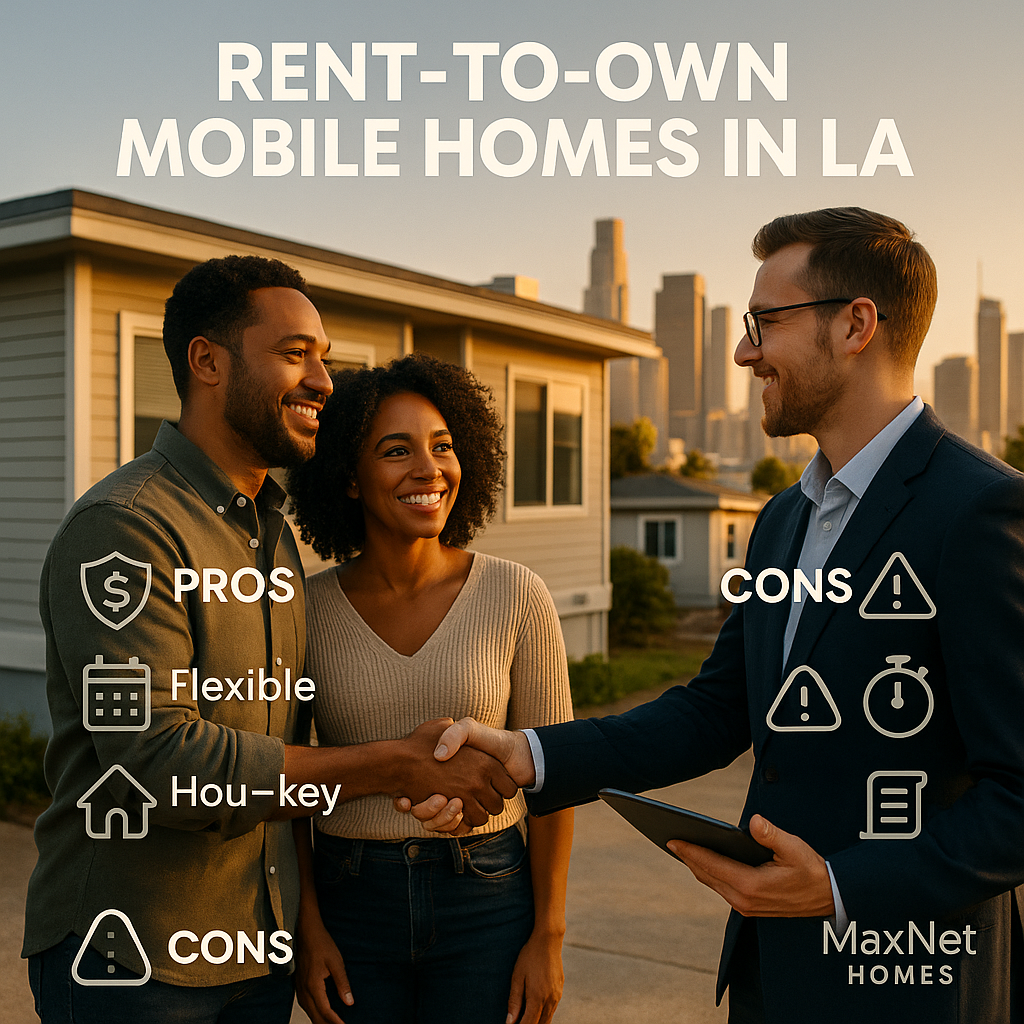
Many Los Angeles home-seekers are feeling priced out of homeownership due to soaring home prices, high interest rates, and strict mortgage requirements. In a market where a modest house can cost over $1 million, some are turning to creative solutions. One option combining affordability with flexibility is rent-to-own mobile homes (also known as lease-to-own manufactured homes). This approach lets you live in a mobile or manufactured home as a renter with the option to buy later – often without needing a huge down payment upfront. It sounds tempting, especially in high-cost areas like L.A., but is it right for you?
In this guide, we’ll break down the pros and cons of rent-to-own mobile homes with a focus on Los Angeles and even 55+ communities. We’ll explain how these agreements work, what to watch out for, and how local experts like Tricia Watts and MaxNet Homes can help you navigate opportunities. Our goal is to provide clear, practical insights so you can decide if a mobile home rent-to-own path is a smart move for your situation.
How Does Rent-to-Own for a Mobile Home Work?
Rent-to-own (or lease-to-own) for a mobile home is a hybrid between renting and buying. You start by renting the home, but your agreement gives you a chance to purchase the mobile home after a certain period. There are two common types of arrangements:
- Lease with Option to Purchase: You rent the mobile home now with the option to buy it before the lease ends. This usually involves paying a one-time option fee upfront, which secures your right (but not obligation) to purchase at a set price later. If you choose not to buy, you can walk away when the lease is up (though you’d likely lose that option fee).
- Lease-Purchase Agreement: This is a more binding contract where you agree to purchase the mobile home at the end of the lease. The purchase price and terms are agreed upon from the start, and often part of your monthly rent is credited toward the purchase price. In other words, each month you’re building equity in the home. However, with a lease-purchase you must buy the home at the end or face penalties for breaking the contract.
Typical Timeframe: Rent-to-own agreements usually last 1 to 3 years, with 3 years being common. This gives you time to improve your credit, save money, or sell another property before financing the purchase. During this period, you live in the home just like any renter or owner would.
Payments and Fees: In a rent-to-own deal, your monthly payment is often a bit higher than market rent. That’s because a rent premium (extra amount) may be applied, with that extra portion earmarked as a future down payment credit. Here are typical costs to expect:
- Option Fee (Option Consideration): An upfront fee you pay for the purchase option. It’s often negotiable and might range from ~2.5% up to 8% of the home’s price. For example, on a $150,000 mobile home, an option fee might be $3,000–$12,000. This fee is usually non-refundable, but it counts toward the price if you buy.
- Monthly Rent & Premium: You pay monthly rent to live there. If the normal rent might be $1,000, a rent-to-own seller could charge maybe $1,100 or more, with that extra $100+ going toward your future purchase (the rent credit). Over a few years, those credits add up as part of your down payment.
- Down Payment: In many rent-to-own contracts, you do not need an additional down payment beyond the option fee and rent credits. This is a big draw for buyers without a large lump sum of cash. (In a lease-purchase, the contract might stipulate a down payment upfront, but often the option fee covers it.)
Maintenance Responsibilities: Be sure to check the lease terms about who handles repairs and upkeep. Often, minor maintenance is on the tenant (you), while major issues might still be the owner’s responsibility during the rental period. For example, you might be expected to maintain the yard or fix a leaky faucet, but if the HVAC breaks, the owner could handle it. Every deal is different – some rent-to-own contracts make the tenant responsible for all maintenance as if you were already the owner. Clarify this in writing so there are no surprises.
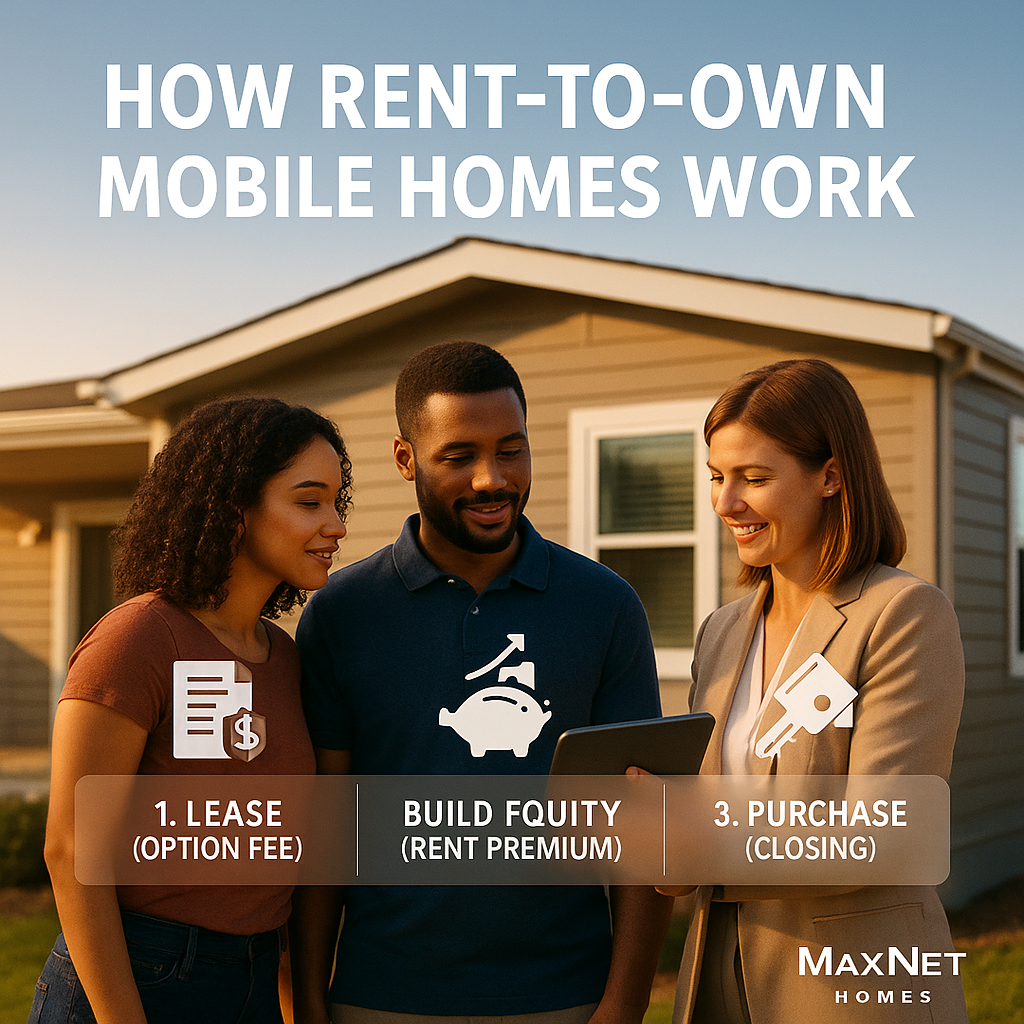
Bottom Line: Rent-to-own mobile home arrangements can be a win-win: you get to move in immediately and start building equity, while the seller gets a committed tenant and potential buyer. But it’s crucial to go in with eyes wide open. These contracts are more complex than a standard lease. Always read the fine print and consider consulting a real estate attorney before signing. You want to fully understand your rights, how and when the purchase price is set, and what happens if you change your mind or can’t secure financing later.
Modern Manufactured Homes: Better Than “Old Trailers”
Before diving into pros and cons, let’s dispel a quick myth: today’s mobile homes aren’t the flimsy “trailers” of the past. In fact, any factory-built home made after June 15, 1976 is legally a “manufactured home” built to strict HUD standards (earlier ones are “mobile homes” under older codes). Modern manufactured homes must meet safety, quality, and efficiency standards, making them durable and comfortable. Many have stylish designs and amenities like open floor plans, vaulted ceilings, energy-efficient windows, and upgraded kitchens – a far cry from the outdated image of a tin can trailer.
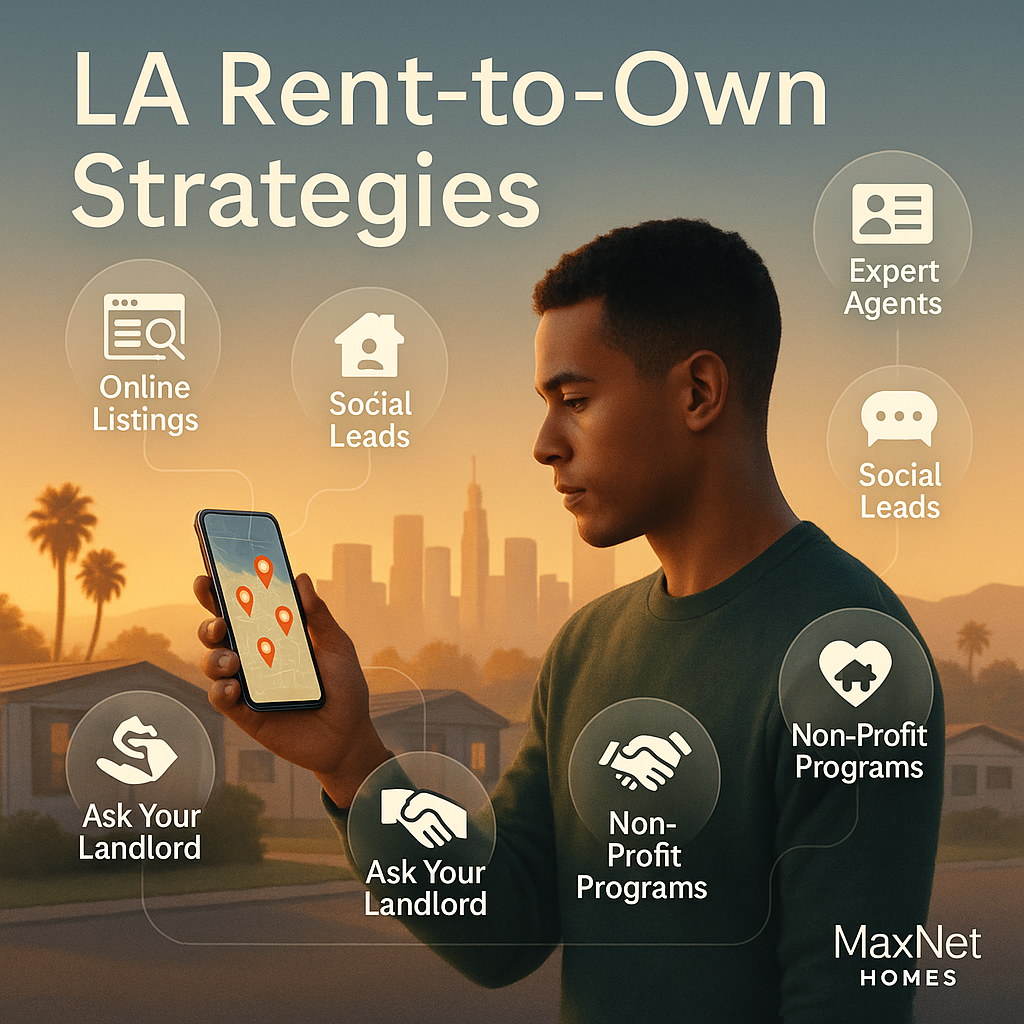
It’s also a myth that you can’t finance a mobile/manufactured home. Many newer manufactured homes do qualify for FHA-insured loans, VA loans for veterans, or specialized chattel loans. So if your credit and situation allow, you might finance a mobile home purchase just like a traditional home (though requirements differ). In short, don’t let old stereotypes scare you off – manufactured homes can be quality housing. In Los Angeles, where new housing is costly, a modern double-wide mobile home can offer over 1,500-2,000 square feet of living space, sometimes in communities with pools, clubhouses, and other amenities. Now, with that in mind, let’s weigh the actual benefits and drawbacks of a rent-to-own scenario.
Pros of Rent-to-Own Mobile Homes in Los Angeles
Opting for a rent-to-own mobile home can offer several unique advantages – especially in a high-priced market like Los Angeles. Here are some key pros from a buyer’s perspective:
- Lower Upfront Cost: You don’t need a huge down payment to get started. This is critical in L.A. where saving 20% for a house can be unrealistic. With rent-to-own, the option fee and first month’s rent might be all you need to move in, making homeownership more accessible to those without large savings.
- Build Equity as You Rent: Part of your rent goes toward the purchase price in many agreements. Essentially, you’re not throwing away all your rent – you’re building equity little by little each month. By the end of the lease, you’ve chipped away at the price, which can make your eventual loan (if needed) smaller.
- Try Before You Buy: A rent-to-own gives you a trial period in the home and community. This is a big plus, especially if you’re unsure about living in a mobile home park or a particular neighborhood. You get to live in the unit for a few years to make sure the size, layout, and community rules fit your lifestyle. If it’s a 55-plus mobile home community, for example, you can see if you enjoy the atmosphere and amenities before committing long-term.
- Easier to Qualify (No Immediate Mortgage): If you can’t qualify for a mortgage right now due to credit issues or lack of income history, rent-to-own can be a stepping stone. There’s no bank loan needed to move in. You have time to improve your credit score during the rental period. Making on-time rent payments might even help your credit. Later, you can apply for a loan to finalize the purchase once you’re financially ready.
- Locked-in Purchase Price: In many contracts, you agree on the purchase price upfront. In a rising market like Southern California, this can be a huge benefit. If Los Angeles home values go up during your lease term, you still get to buy at the earlier agreed price – effectively locking in equity gains. For instance, if you lock in a mobile home at $150,000 and two years later it might be worth $170,000, you still pay $150k. That’s great if the market rises (but remember, prices could also stagnate or fall – more on that later).
- Immediate Housing Security: You get to move in and settle right away without waiting for escrow, lengthy loan approvals, or construction. You’ll have the stability of staying put in the same home you intend to own. This is comforting compared to a regular rental where you might have to move if the landlord sells. With rent-to-own, you’re planning to be the owner, so it’s your future home you’re living in from day one.
- Potential Home Customization: Depending on the agreement, some owners allow or even encourage you to make improvements or customize the mobile home during the rental period. If you’re going to buy it, it makes sense to keep the place up and even upgrade it. You might be able to paint, plant a garden, or update appliances to make it feel like home. (Always get permission for big changes, and be cautious investing too much before you officially own it.)
- Affordability in High-Cost L.A.: Perhaps the biggest pro is the overall affordability. Mobile/manufactured homes themselves are far cheaper than typical Los Angeles houses. For example, one buyer in Eagle Rock (Northeast LA) purchased a mobile home for about $140,000 in a neighborhood where single-family homes average over $1 million. Her monthly costs (loan + lot rent) are under $2,000, which is far less than renting an equivalent apartment or house in that area. For those on a tight budget – including seniors on fixed incomes looking at 55+ communities – a rent-to-own mobile home can represent an attainable path to homeownership that simply doesn’t exist in the traditional housing market of L.A.
In short, rent-to-own mobile homes offer flexibility and a lower barrier to entry. You can lock in a home now, start building equity, and ease into ownership at a comfortable pace. Especially in Los Angeles, where buying a house outright is out of reach for many, this option can be a creative way to get your foot in the door of homeownership.
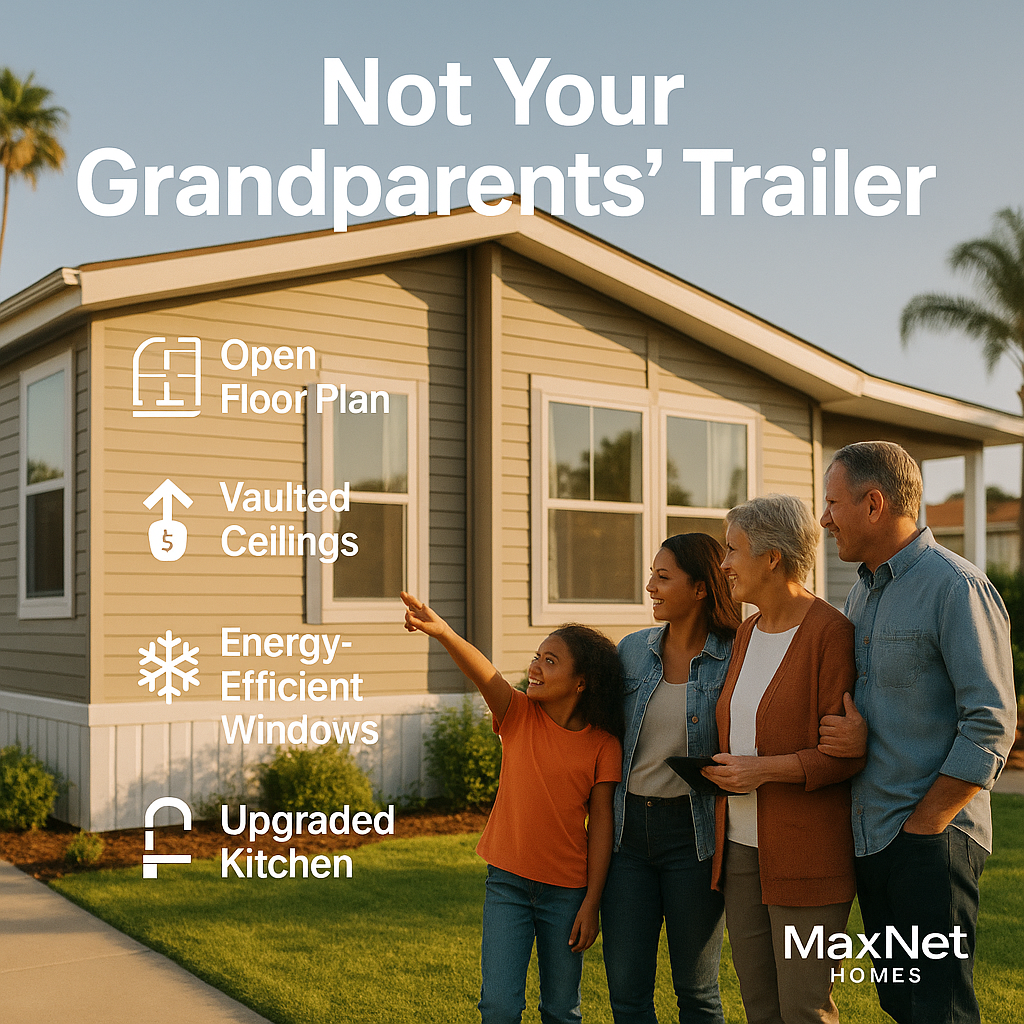
Cons of Rent-to-Own Mobile Homes (and Cautions to Consider)
Rent-to-own arrangements also come with significant risks and drawbacks. It’s important to weigh these cons carefully, because a misstep can cost you money or leave you disappointed. Here are the main cons of rent-to-own mobile homes – including some extra considerations for California and mobile home living:
- Rare and Hard to Find: First off, true rent-to-own mobile homes are not very common. You might have trouble even finding a seller offering this arrangement, as most owners prefer an outright sale. In competitive markets like Los Angeles, any available rent-to-own deals get snapped up quickly. This means you might spend months hunting for the right opportunity.
- Higher Monthly Payments: Expect your monthly rent to be higher than a normal rent for a similar unit. The premium that goes toward your future purchase is essentially extra money you’re paying now. This can stretch your budget. For example, a mobile home that might rent for $1,200 could cost $1,400 in a rent-to-own (with $200 going toward purchase). If money is tight, that higher payment each month could be a strain.
- Risk of Losing Money: Perhaps the biggest risk – if you decide not to buy at the end, or can’t secure a mortgage to complete the purchase, you forfeit the extra money paid. The option fee and any rent credits usually do not get refunded. You walk away with nothing to show for those payments. For instance, if over 3 years you paid $5,000 in option/rent credits and then something goes wrong, that $5,000 is gone. Unfortunately, many rent-to-own agreements never actually result in a sale – some estimates say up to half of would-be rent-to-own deals fall through (the tenant backs out or can’t qualify for a loan in time). So this is a very real concern.
- Locked In (Lease-Purchase Obligations): If you signed a lease-purchase (not just an option), you are legally obligated to buy the home when the lease ends. If your situation changes or you get cold feet, you could potentially face legal consequences or lose a hefty deposit for breaking the contract. Always make sure you’re confident in your decision before committing to a lease-purchase.
- Limited Inventory & Choice: You might not get your dream home in a rent-to-own. Since the inventory is limited, you may have to compromise on location or features. You can’t be as picky as a regular homebuyer. For example, if you specifically want a double-wide mobile home rent-to-own with a big yard in a certain part of L.A., you might be waiting a long time. You may need to take what you can find.
- Slower Appreciation (and Depreciation Risk): Manufactured homes generally appreciate slower than traditional houses, and some actually depreciate, especially older models. If the home’s value doesn’t increase (or drops) by the time you’re set to buy, you could end up paying above market value. In Los Angeles, desirable locations can help a mobile home hold or increase value, but it’s not a guarantee. You’re taking a bit of a gamble locking in a future price. On the flip side, if the market jumps and the home is worth a lot more, the seller might regret locking in too low – but that’s their risk.
- Financing Still Uncertain: Rent-to-own is not a substitute for a mortgage – it’s a delay. You’ll eventually need to secure financing (or pay cash) to complete the purchase, unless you saved enough during the lease. If your credit or income situation doesn’t improve as hoped, you might struggle to get a loan when the time comes. There’s no guarantee a lender will approve you later. Always have a plan: work on your credit score, keep your debt low, and maybe get pre-qualified as you approach the purchase date.
- Maintenance and Repair Costs: Unlike a typical rental, a rent-to-own often puts more maintenance responsibility on you as the future owner. That means unexpected costs. If the water heater breaks or the roof leaks during your lease, you might have to fix it out-of-pocket. Those expenses won’t be reimbursed if you end up not buying the home. Budget for upkeep just as if you own it already.
- Limited Changes Until You Own: While you can do some cosmetic touches, you usually can’t sell or significantly remodel the home until you actually own it. Your control is limited. If you wanted to, say, add a porch or extend a room, the owner (and possibly the park management) has to approve. You’re in a bit of a limbo state – not a renter with no stake, but not the full owner yet either.
- Contract Complexity & Legal Risks: Rent-to-own contracts can be complicated, full of clauses about who pays for what, deadlines, and conditions. If you don’t understand the contract, you could be agreeing to something that bites you later. For example, some contracts might state that if you’re late on a payment, the option is void and you lose all money paid. Always read carefully and consider professional advice. Also, watch out for scams – unfortunately, there are cases of unscrupulous “sellers” who take option fees from multiple prospective buyers or misrepresent a property. Verify that the person offering rent-to-own actually owns the home and has the right to sell it.
- Community Rules and Rental Increases: If the mobile home is in a park community, you not only have the purchase agreement with the owner, but also the park’s rules and rent to deal with (more on this below). Park owners can sometimes raise the lot rent or fees, which will affect your cost of living. In Los Angeles, some areas have rent stabilization for mobile home parks, but others do not. Imagine budgeting for a $1,000/month space rent only for it to increase to $1,100 the next year – that’s out of your control if not regulated. You need to factor in possible increases (many parks in California can raise rents a certain percent annually). Additionally, park rules could restrict things like pets, visitors, or if you plan to rent out the mobile home later (many parks do not allow subletting at all).
In summary, a rent-to-own mobile home requires careful consideration and a bit of a leap of faith. You stand to gain a foothold in the market, but you also take on risks that could cost you money. In a place like LA where every dollar counts, weigh these cons heavily against the pros. Make sure the agreement is fair and realistic for you.
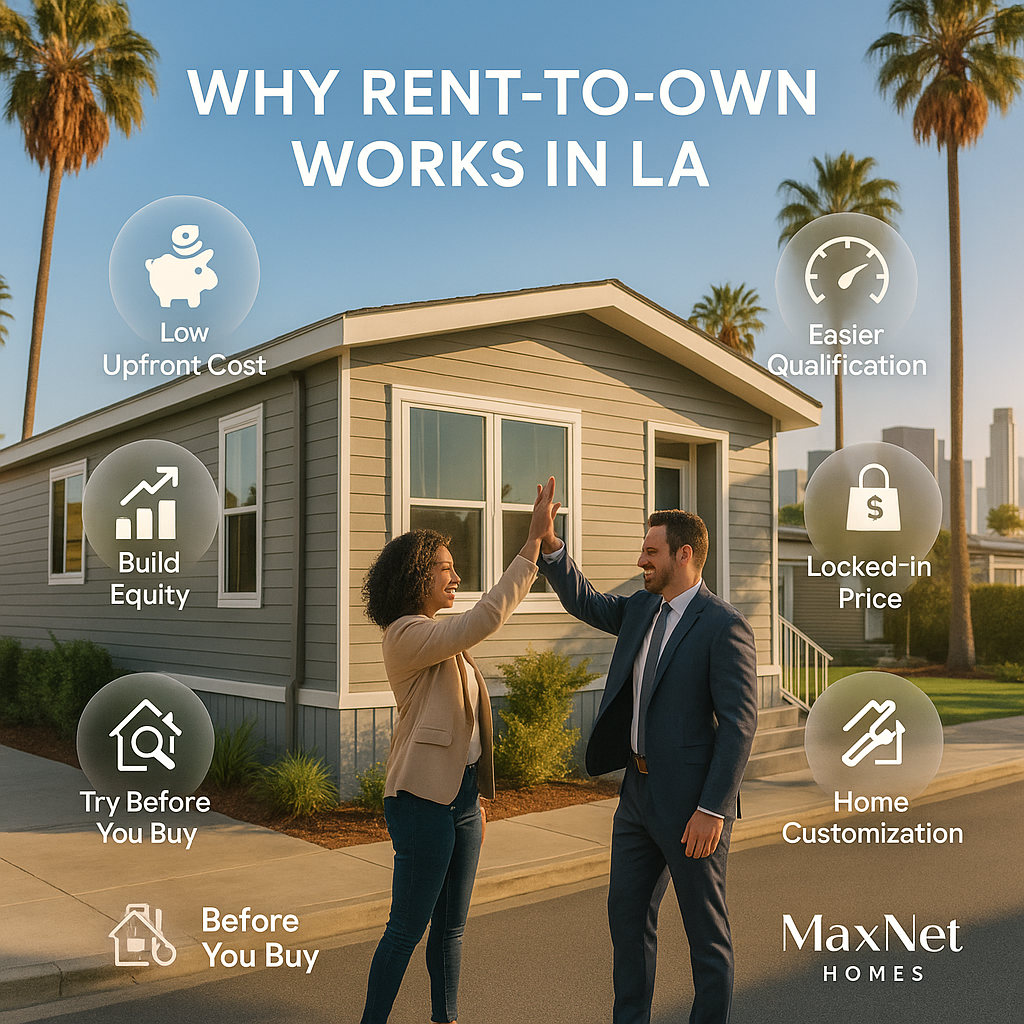
Community Park Considerations (Land, 55+ Rules, and More)
Most mobile homes in Los Angeles (and California in general) are located in mobile home parks or communities where you lease the land (sometimes called trailer parks or manufactured home communities). This introduces a few special considerations when doing rent-to-own:
- Who Owns the Land? It’s critical to know if the land is included in the deal or not. In L.A., it’s far more common that the mobile home is being sold (or rented) but the land is not – you’ll be paying monthly lot rent to the park owner. Always ask: Am I just renting-to-own the home, and if so, what is the space rent and who sets it? If the land is part of the deal (rare in LA city but possible in outskirts), the scenario is more like a traditional home sale which is a big plus, but you’ll pay a lot more for that combination.
- Park Rent and Fees: If you’ll be renting the lot, find out the current space rent and recent history of increases. Some parks (or cities) have rent control – for example, the City of Los Angeles has rent control for older mobile home parks, which can cap how much the landlord can raise lot rent annually. In the Business Insider story we cited, the owner paid about $1,100/month for space rent under rent control. Other parks, especially in unincorporated areas or other cities, may have no such caps, meaning rent could jump significantly year to year. Expensive parks in desirable areas (beach-adjacent, etc.) might charge $1,500–$2,000+ monthly for space rent, though they often offer amenities in return. You need to budget for this separate cost on top of your rent-to-own payment. Tip: Try to get a written understanding of how lot rent is handled during your rent-to-own period. Some agreements might lock the lot rent for a couple years, others might not.
- Park Rules and 55+ Communities: Every mobile home community has rules and regulations (often called CC&Rs or park bylaws). Especially in 55-plus mobile home parks, there are age restrictions – usually at least one resident must be 55 or older, and often no one under 45 or 18 (varies by park) can live there. If you’re pursuing a rent-to-own in a senior community, make sure you qualify and are comfortable with any lifestyle rules (quiet hours, pet policies, etc.). Even in all-ages parks, rules can affect you – for example, rules on exterior changes, whether you can have a shed, how many cars, etc. Read the park’s rules before you commit to living there long-term. Also be aware that some parks do not allow rentals; they require owner-occupancy. So if your plan was to eventually rent out the mobile home for income (buy and rent it to someone else), many parks will forbid this. Always check if “can I rent out a mobile home” is possible in that park. Usually, the answer is no unless it’s a designated rental mobile home park. The intention is that you will be an owner-occupant.
- Condition of the Park: Not all parks are equal. Some are beautifully maintained resort-like communities; others might be run-down. The quality of management will affect your experience. Visit the park, talk to a few residents if possible, and observe things like maintenance, security, and vacancy rates. A park with many empty lots or many “For Sale” signs might signal poor management or high rents. Since you may live there for years (and potentially own a home there), you want a park that is stable and well-run. In Los Angeles, there are famed upscale parks (like those in coastal Orange County or parts of the Valley) and more modest parks in various neighborhoods – choose one that fits your comfort and budget.
- Potential for Redevelopment: In hot urban markets, occasionally mobile home parks get sold for redevelopment (e.g., to build apartments). California law provides some protections and compensation in such cases, but it’s still a disruption. It’s not common, but it’s worth considering the long-term viability of the park if you’re planning to own there. A quick news or Google search of the park’s name might show if there are any rumors or past disputes.
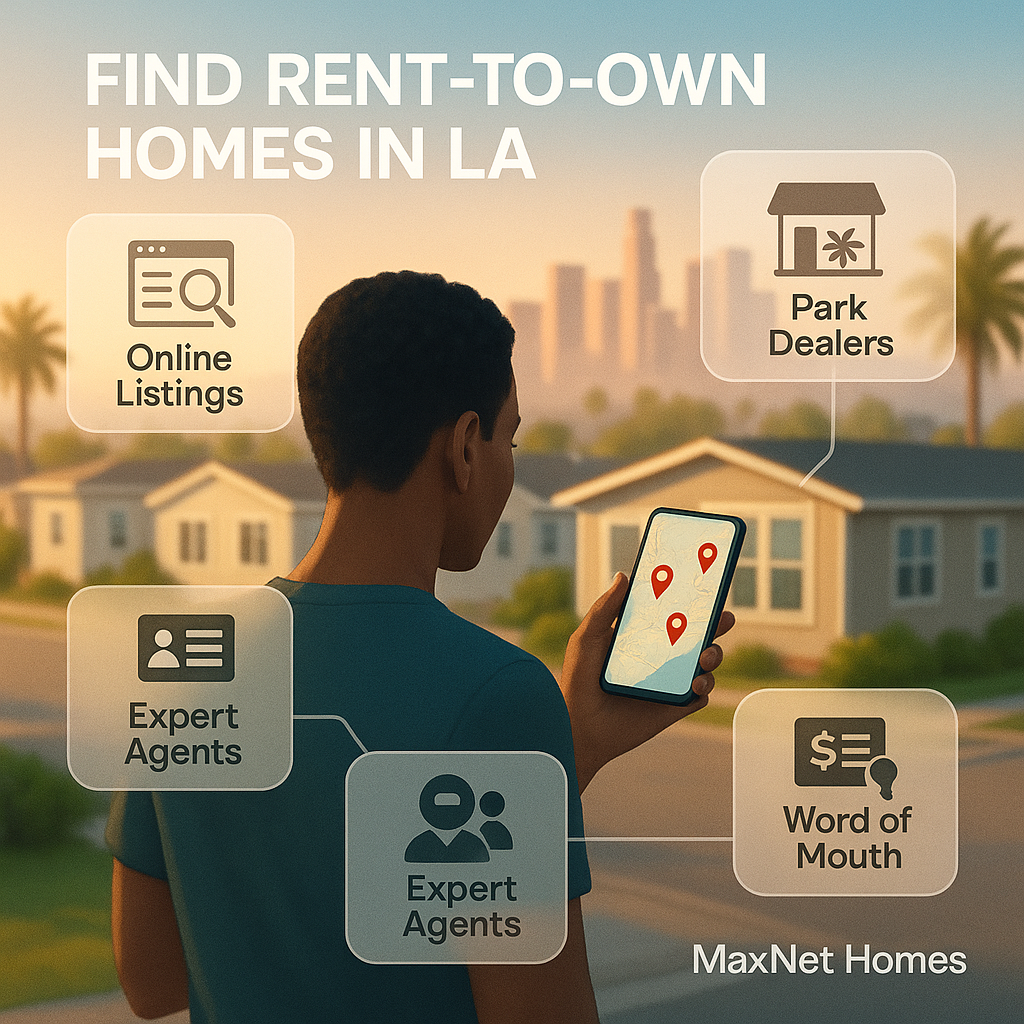
Key takeaway: When doing a rent-to-own in a mobile home park, you must evaluate both the home and the park. Understand the land lease terms, community rules, and any age restrictions. This is especially important for seniors eyeing a 55+ community rent-to-own – you want to ensure the community meets your needs (healthcare access, social activities, etc.) and that you’re eligible. A little due diligence up front can save a lot of headache down the road.
How to Find Rent-to-Own Mobile Homes Near You (Los Angeles Tips)
Finding a rent-to-own mobile home can feel like searching for a needle in a haystack. There’s no one-stop MLS for these deals, and many sellers don’t openly advertise rent-to-own unless asked. Here are some strategies to find rent-to-own opportunities in Los Angeles (or nearby areas):
- Online Listings and Marketplaces: Start with websites that list rent-to-own homes or mobile home sales. While few and far between, you might spot listings titled “Rent to Own Mobile Home” or “Lease Option” on general real estate sites or Craigslist. There are also specialized platforms for rent-to-own deals – a quick search can turn up sites focusing on lease-to-own properties. Be cautious of scams and never send money without viewing a home.
- Local Mobile Home Dealers or Communities: Sometimes the offices of mobile home parks know of owners who want to sell or are open to creative arrangements. Visit or call mobile home parks in your target areas (Los Angeles has parks in areas like Sylmar, San Fernando Valley, Carson, Long Beach, etc.). Ask if they know of any rent-to-own possibilities. Park managers might know if a resident is looking to move and would consider a lease-option, especially if the home hasn’t sold via traditional means.
- Real Estate Agents with Manufactured Home Experience: Connect with a local real estate agent who specializes in manufactured homes or creative financing deals. An experienced agent can be invaluable – they might know of off-market opportunities or be able to negotiate a rent-to-own on a listing that isn’t selling. For example, if a mobile home has been listed for sale in LA for 100 days with no buyer, the owner might consider a lease-option offer to get it occupied. Agents can help find these scenarios and ensure the contract is fair. (MaxNet Homes’ own Tricia Watts, for instance, has experience in the Los Angeles area with non-traditional sales – a knowledgeable agent like her can often sniff out opportunities that the average buyer would miss.)
- Word of Mouth and Social Media: Leverage community connections. Let friends, family, or coworkers know you’re looking for a mobile/trailer home with rent-to-own terms. Sometimes private owners would consider rent-to-own if they personally trust the tenant-buyer. Also, check Facebook groups or online forums for Los Angeles housing. There are local groups where people discuss mobile homes or affordable housing – someone might post a lead there. Websites like Reddit (e.g., r/LosAngeles or r/RealEstate) occasionally see discussions on alternative housing; keep an eye out.
- Current Rental Situations: Are you currently renting a mobile home or know someone who is? If you’re a long-term renter of a mobile unit, approach the owner about a rent-to-own trailer home arrangement. Some landlords might be open to selling to you if they see you as a reliable tenant. This can be a win-win: they get a guaranteed buyer later, and you solidify your path to ownership.
- “Near Me” Searches: Simply searching online for “mobile homes rent to own near me” or “rent-to-own mobile homes in Los Angeles” can yield some results, but be prepared to wade through many unrelated listings or ads. Many results might be outdated or outside the area. Use specific terms like “manufactured home lease option in Southern California” to narrow it down.
- Affordable Housing Non-Profits: In some cases, non-profit housing organizations in California offer rent-to-own programs for low-income families involving manufactured homes. It’s a long shot in L.A., but it’s worth researching if any local housing initiatives include mobile/manufactured home pathways for ownership or lease-purchase.
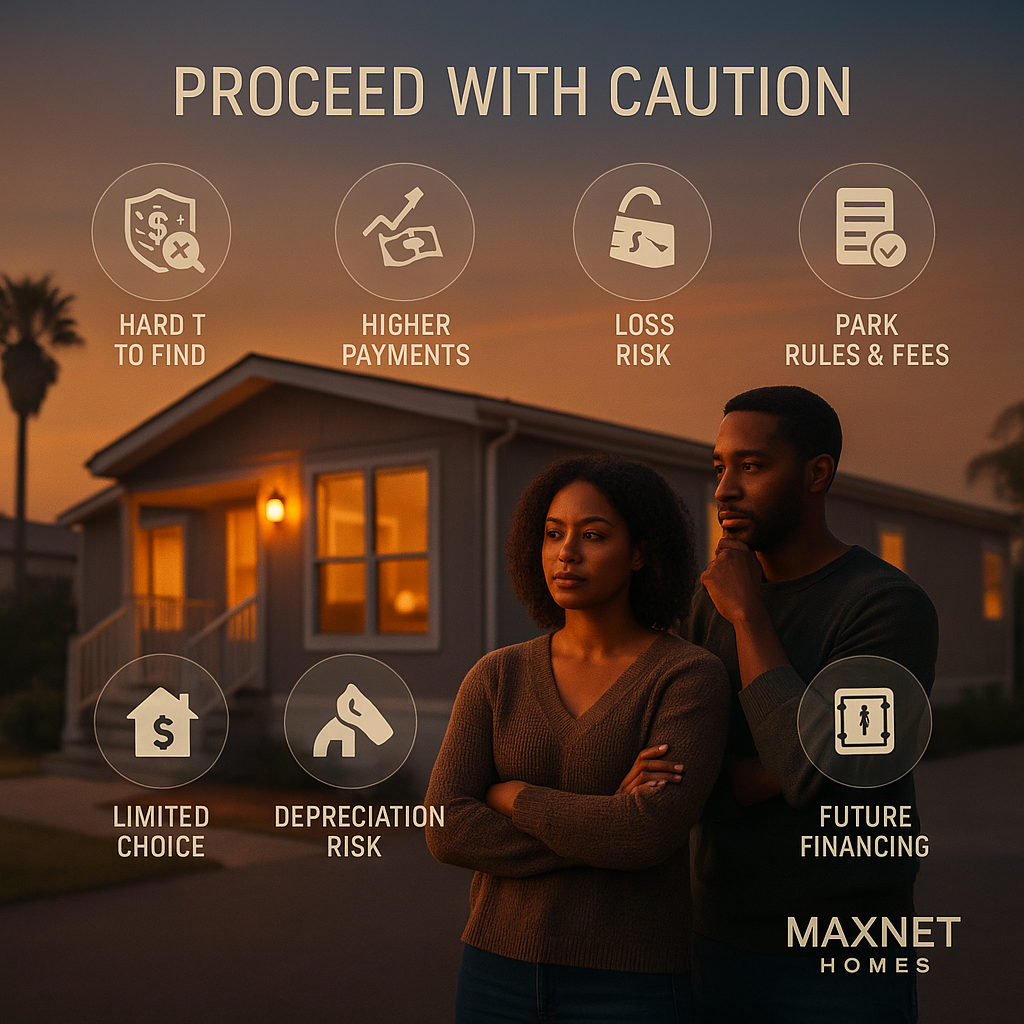
Be Persistent and Patient: Given the rarity of these deals, you may need to explore multiple avenues and be ready to act fast when an opportunity comes up. If you do find a prospect, remember all the precautions we discussed: vet the contract thoroughly, ensure you can afford the terms, and possibly get an appraisal or inspection of the mobile home so you know its true condition and value before committing.
Should You Consider a Rent-to-Own Mobile Home in LA?
Rent-to-own mobile homes aren’t for everyone. They require the right situation and mindset. Here are a few final points to consider when deciding if this path makes sense for you:
- Your Financial Discipline: Are you confident you’ll be financially ready to buy at the end of the lease? Make sure you’re actively improving your finances during the rental period – whether that means paying down debt, boosting your credit score, or building savings. The arrangement only pays off if you can execute the purchase eventually.
- Contract Clarity: Never enter a rent-to-own without full understanding of the agreement. Key items to confirm include when and how the purchase price is decided, what happens if you pay late, who covers which expenses, and the process to exercise your purchase option. If anything is vague or seems unfair, negotiate or walk away. It’s better to lose a potential deal than to sign a bad contract.
- Home Value and Pricing: Do some homework on the fair market value of the mobile home now and consider its likely value in a few years. If the contract locks you in to pay significantly above market price, that’s a red flag. Remember to factor in the depreciation/appreciation trend for that type of home in that location. In Los Angeles, location is huge – a mobile home in a desirable park may hold value, whereas one in a less popular area might not. Compare recent sales of similar units if possible.
- Alternative Options: Consider if buying outright (with a loan) or continuing to rent and saving more might be better. For example, if you qualify for an FHA loan for a manufactured home, you might be able to buy now with a low down payment, avoiding the complexities of rent-to-own. On the other hand, if credit issues or lack of down payment are the only things holding you back, then a rent-to-own could be the bridge you need.
- Gut Feel About the Park and Home: You should feel good about the prospect of living there long-term. If the mobile home or the park gives you pause (maybe the neighbors seem unfriendly, or the home needs a lot of repairs), listen to those concerns. The deal might not be worthwhile if you won’t be happy living there even after you own it.
In a high-cost city like Los Angeles, a rent-to-own mobile home can be a strategic stepping stone. It’s one of the few ways to potentially secure a home without the typical upfront costs, allowing you to lock in a price and work toward ownership gradually. For some, it’s an ideal solution – for others, the restrictions and risks make it less attractive than saving up or looking at other housing options. Think about your long-term goals: Is this home something you see yourself in for 5+ years? Will it help you eventually move up to another property, or is it your comfortable landing spot for retirement? Your answers will guide you.
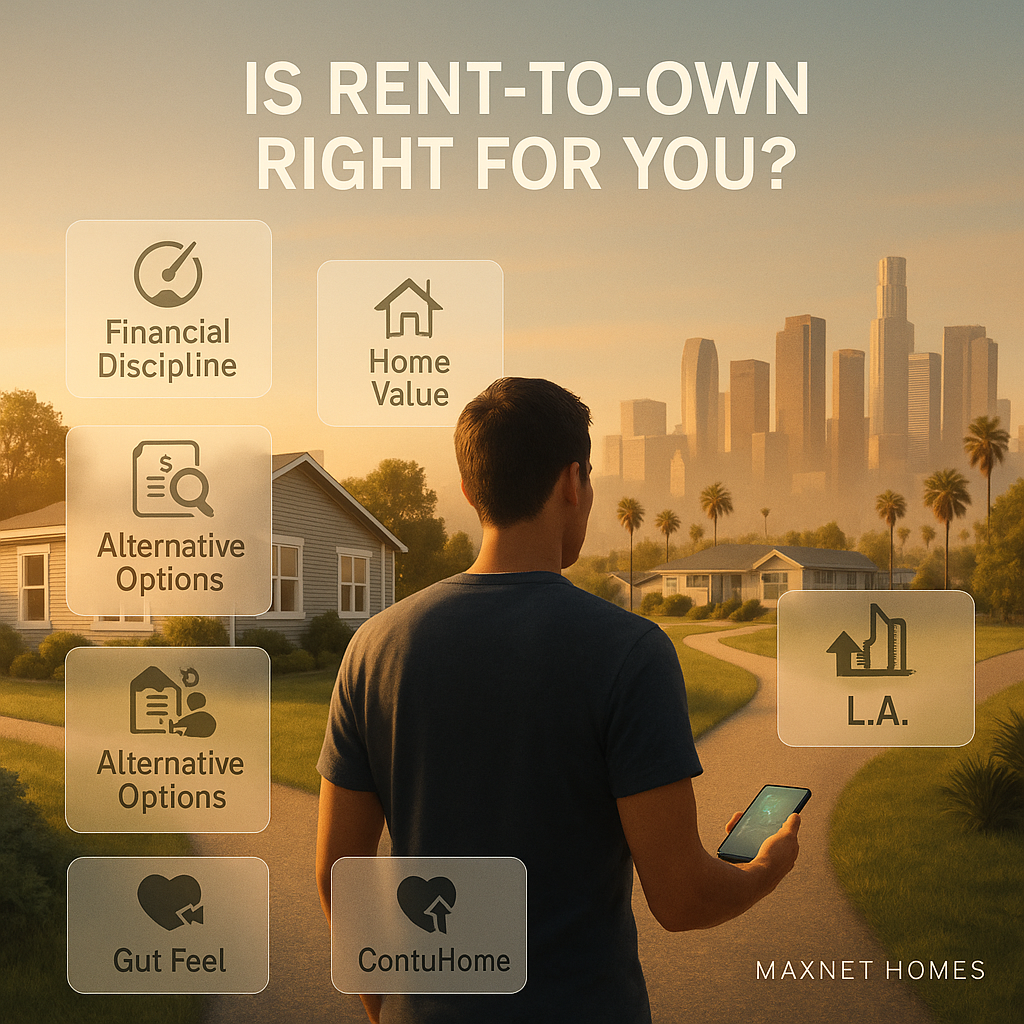
MaxNet Homes: Helping You Navigate Rent-to-Own Opportunities in Los Angeles
Exploring a rent-to-own mobile home (or any unconventional housing option) can be confusing – but you don’t have to go it alone. MaxNet Homes, led by local real estate expert Tricia Watts, is here to help Los Angeles buyers and renters make sense of these opportunities. With deep experience in the L.A. market, Tricia and the MaxNet Homes team have a straightforward and empathetic approach to real estate solutions.
How can MaxNet Homes assist you?
- Personalized Guidance: We take the time to understand your situation, whether you’re a first-time buyer struggling with high prices, a senior looking at 55+ community options, or an investor curious about mobile homes. We’ll help identify if a rent-to-own scenario fits your needs or if another path might be better.
- Finding Opportunities: As mentioned, finding rent-to-own mobile homes in Los Angeles is challenging. Tricia Watts leverages her network and market knowledge to uncover possibilities – maybe a homeowner open to creative financing, or a mobile home listing that could consider a lease-option. We stay on top of the market so you hear about opportunities early.
- Evaluating Deals: Not sure if a deal is too good to be true? We’ll vet the contract and terms with you. MaxNet Homes can connect you with reputable real estate attorneys or financial advisors as needed to ensure everything is above-board. Our goal is to protect your interests and set you up for success, not just make a quick sale.
- Local Expertise: The Los Angeles area has its own quirks – from city rent control ordinances to varying park rules in different communities (Torrance vs. Pasadena vs. the Valley). Our team knows these local details. We can advise on which areas have low space rent, which 55+ parks are most welcoming, or what financing options local banks might offer for manufactured homes.
- Ongoing Support: Even after you’ve found a home, we don’t disappear. If you enter a rent-to-own agreement, that’s just the beginning of your journey. MaxNet Homes will check in, help you prepare for the eventual purchase (for example, getting a mortgage pre-approval as your option date nears), and be a resource for any questions about homeownership along the way. We genuinely want to see you succeed and reach that moment where you have the keys in hand as the owner.
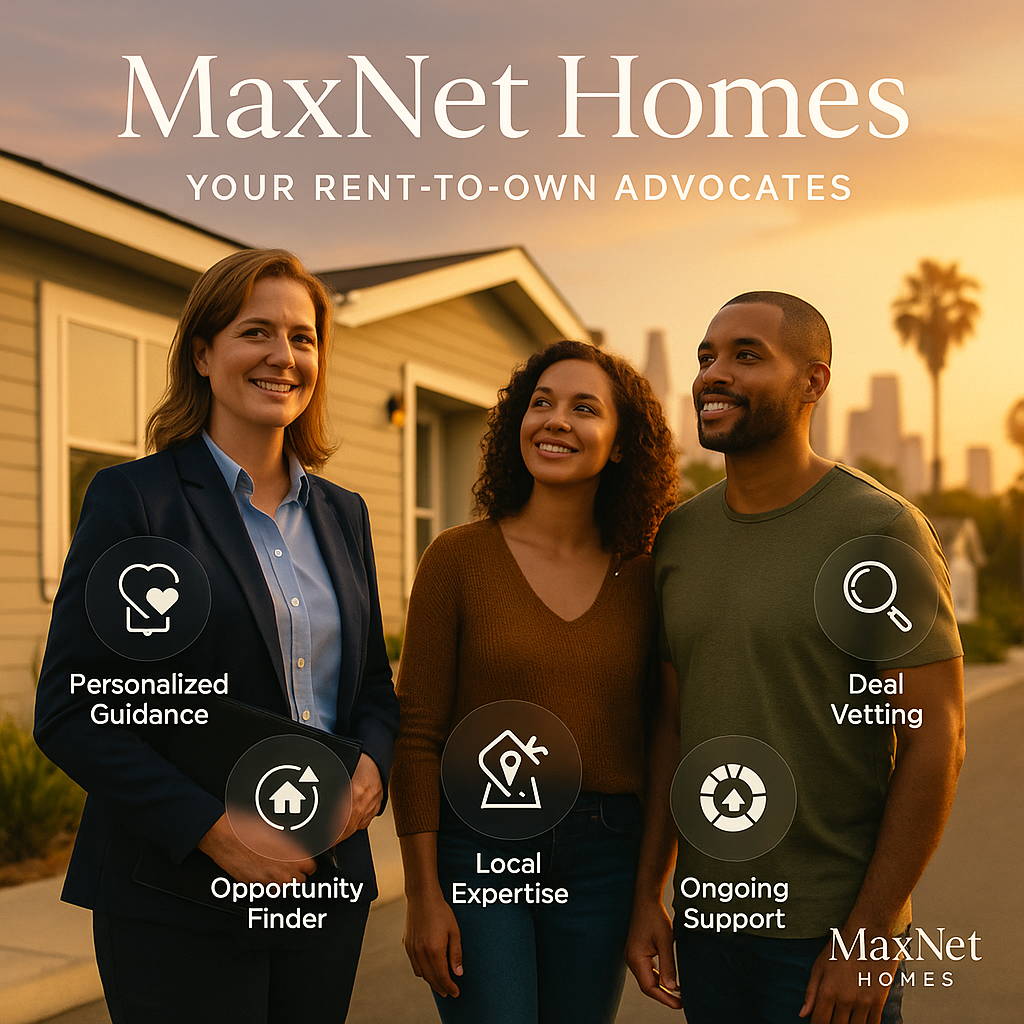
At MaxNet Homes, our philosophy is encapsulated in our name – maximizing your net gains, whether that’s net profit from a sale or net happiness in a new home. Rent-to-own mobile homes are one of the many ways we help clients find creative solutions in a tough market. If you’re curious about this path or other non-traditional home buying strategies in Southern California, reach out to Tricia Watts and the MaxNet Homes team today. We pride ourselves on being helpful, trustworthy local experts who will give you honest advice.
Ready to Take the Next Step?
Los Angeles may be a challenging real estate market, but with the right knowledge and guidance, you can find an affordable place to call home. A rent-to-own mobile home is just one option that might bridge the gap between renting and owning – offering flexibility, affordability, and a chance to build equity over time. By understanding the pros and cons, doing your due diligence, and partnering with experts like MaxNet Homes, you’ll be well-equipped to make the best decision for your future.
If you’re ready to explore mobile home rent-to-own opportunities in L.A. or want to discuss other ways to achieve homeownership, contact us at MaxNet Homes. We’re here to help Los Angeles residents like you navigate the real estate maze and come out on top. Don’t let high prices stand in the way of your homeownership dreams – with the right approach, your affordable home in Los Angeles could be closer than you think. Let’s unlock the possibilities together!




